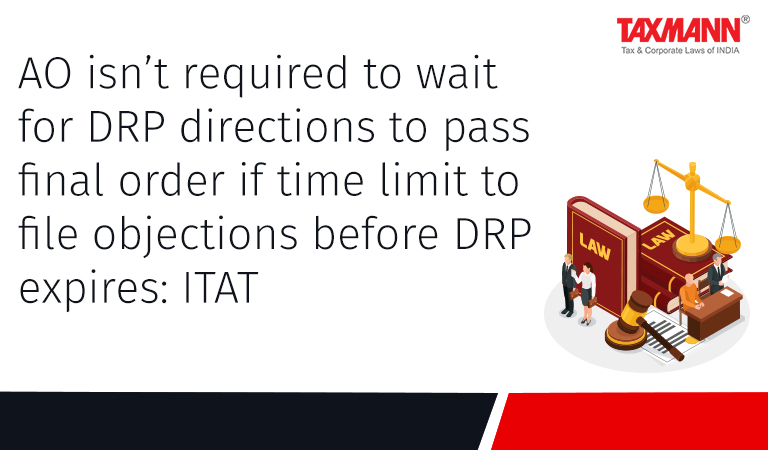AO isn’t required to wait for DRP directions to pass final order if time limit to file objections before DRP expires: ITAT
- Blog|News|Transfer Pricing|
- 2 Min Read
- By Taxmann
- |
- Last Updated on 29 January, 2022

Case Details: Astro Offshore Pte. Ltd. v. DCIT - [2022] 134 taxmann.com 99 (Delhi - Trib.)
Judiciary and Counsel Details
-
- Saktijit Dey, Judicial Member and Dr. B.R.R. Kumar, Accountant Member
- Ved Jain, Adv. and Ashish Goel, CA for the Appellant.
- Mrs. Anupama Anand, CIT (DR) for the Respondent.
Facts of the Case
Assessee was a non-resident company incorporated under the laws of Singapore. Assessing Officer (AO) reopened the assessment of assessee and proceeded to frame draft assessment order under section 147 read with section 144C(1).
Against the draft assessment order, the assessee raised objections before Dispute Resolution Panel (DRP). The DRP noticed that the objections filed by the assessee were beyond the period of limitation prescribed under section 144C(2). Thus, the DRP dismissed the objection in limine.
AO passed the final assessment order after receiving directions from the DRP. Assessee filed appeal before the Tribunal contending that final assessment order was invalid. AO was required to pass the order within one month from the end of the month, in which the period of filing objections before DRP expired.
ITAT Held
The Delhi Tribunal held that a combined reading of the provisions contained under sections 144C(1), (2), (3) and (4) makes it abundantly clear that there is no compulsion on the AO to wait beyond the period of limitation prescribed under the statute for completing the final assessment, anticipating that the assessee would be filing an objection before the DRP.
The assessee has 30 days from the date of receipt of the draft assessment order to file objections before the DRP. AO is duty-bound to complete the assessment based on the draft assessment order on expiry of thirty days from the date of receipt of the draft assessment order if, by that time, the assessee had not filed the objections before DRP.
In the instant case, the assessee filed objections after the expiry of the limitation period. Thus, the final assessment order should have passed within one month from the end of the month in which the period of filing of objections expired. However, the AO waited for the directions of the DRP before passing the final assessment order.
The period of limitation prescribed under sub-section (2) and (4) is sacrosanct and has to be strictly followed, both by the assessee and the Revenue. Therefore, the final assessment order passed beyond the limitation period must be declared invalid.
List of Cases Referred to
-
- Yokogawa India Ltd. v. Asstt. CIT [ITA (TP) Appeal Nos. 1715 & 692 (Bang.) of 2016, dated 8-3-2021] (para 5)
- TDK Electronics AG v. Asstt. CIT [2020] 116 taxmann.com 986 (Pune – Trib.) (para 5)
- Aalaya Jewel Industry (P.) Ltd. v. Asstt. CIT [2018] 93 taxmann.com 23 (Chennai – Trib.) (para 5)
- Planet Online (P.) Ltd. v. Asstt. CIT [2016] 65 taxmann.com 46 (Hyd. – Trib) (para 5).
Disclaimer: The content/information published on the website is only for general information of the user and shall not be construed as legal advice. While the Taxmann has exercised reasonable efforts to ensure the veracity of information/content published, Taxmann shall be under no liability in any manner whatsoever for incorrect information, if any.

Taxmann Publications has a dedicated in-house Research & Editorial Team. This team consists of a team of Chartered Accountants, Company Secretaries, and Lawyers. This team works under the guidance and supervision of editor-in-chief Mr Rakesh Bhargava.
The Research and Editorial Team is responsible for developing reliable and accurate content for the readers. The team follows the six-sigma approach to achieve the benchmark of zero error in its publications and research platforms. The team ensures that the following publication guidelines are thoroughly followed while developing the content:
- The statutory material is obtained only from the authorized and reliable sources
- All the latest developments in the judicial and legislative fields are covered
- Prepare the analytical write-ups on current, controversial, and important issues to help the readers to understand the concept and its implications
- Every content published by Taxmann is complete, accurate and lucid
- All evidence-based statements are supported with proper reference to Section, Circular No., Notification No. or citations
- The golden rules of grammar, style and consistency are thoroughly followed
- Font and size that’s easy to read and remain consistent across all imprint and digital publications are applied



 CA | CS | CMA
CA | CS | CMA
